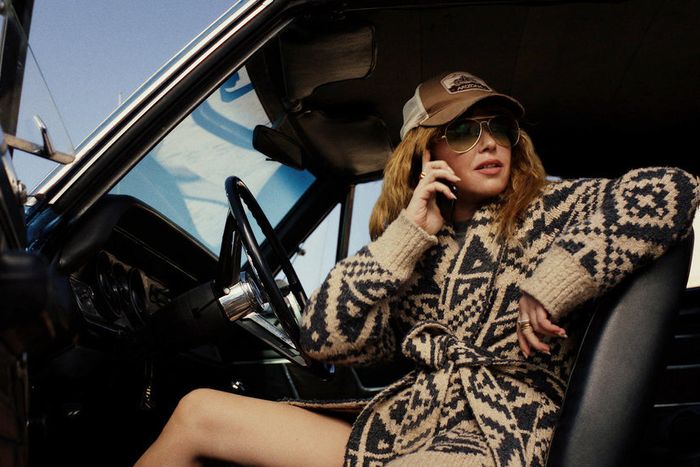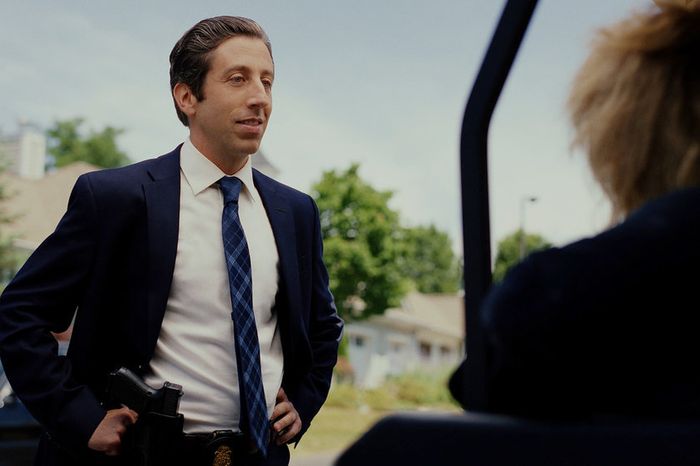
Charlie Cale is not a cop. Natasha Lyonne’s Poker Face protagonist wears police-style aviators and functions like a human polygraph test, but she’s a little too anti-authoritarian, a little too much of a loner to fit into a station briefing room or the front of a black-and-white cruiser. She’s an ordinary woman with an extraordinary extrasensory ability just trying to get by. During the first season of the series, she twice turns down job offers from the FBI, rebuffing the first in “Time of the Monkey” with a bemused “I’m not really about helping the man,” then the second with a sarcastic smirk in finale “The Hook.” But whenever Poker Face drew its thin blue line this season, it put Charlie on one side of it and everyone else on the other. When making a show about crime and punishment, is there any way to avoid making copaganda? That’s one mystery Poker Face hasn’t quite solved.
The Peacock series from creator Rian Johnson, who wrote three episodes and directed the premiere and finale, follows the critical and commercial success of his Knives Out film franchise. In both Knives Out and Glass Onion, Daniel Craig’s mellifluously accented detective, Benoit Blanc, faces off against the worst of the one percent and helps a young woman of color receive some kind of payback for the injustices she has suffered. Those films are whodunits (a genre Johnson adores) that lay out their twists and turns right from the beginning, and when Glass Onion switches perspectives midway through to Janelle Monáe’s amateur sleuth, Helen, the film allows viewers to catch up on what they missed from a different point of view. Poker Face takes that same format, inspired by Peter Falk’s iconic Columbo, and centers within it Lyonne’s Charlie — who, like Blanc, has a tendency to get immersed in cases in which the victims are nearly universally virtuous people.
Premiere episode “Dead Man’s Hand” establishes the first season’s narrative arc: Charlie is a drifter with the ability to discern other people’s lies — a skill she used to win big at a series of poker games until casino owner Sterling Frost Sr. (Ron Perlman) picked up on her pattern and ruined her reputation. He forces her to work at his place, and Charlie is aimless until her friend and co-worker Natalie (Dascha Polanco) is killed by Frost’s son (Adrien Brody) and his enforcer, Cliff LeGrand (Benjamin Bratt), for learning that one of their high rollers — and intended marks — possessed child pornography. As soon as Charlie begins to investigate what happened to her friend, Poker Face creates a binary in which Charlie is reminded that despite her heightened perception of “bullshit,” she has no actual enforcement power. First, the script makes Charlie a wrongdoer figuratively: In trying to persuade Charlie to help scam gamblers so that the house always wins, Sterling Frost Jr. says of her hesitance to use her lie-detecting ability, “For you to not use this is criminal.” (Note that word choice.) And later, when Charlie goes to the police for help, not yet knowing that the Frost family essentially runs the force via bribes and favors, the script again emphasizes that division: “Trust us to do our job. You’re not a cop,” the sheriff says.
By the end of the episode, Charlie’s attempts to find out what happened to Natalie have led to Frost Jr. jumping from a balcony, Frost Sr. and Cliff framing Charlie for his death, and Charlie sending evidence of the child-pornography ring to the FBI before hitting the road out of Nevada. The shot of Charlie’s Plymouth Barracuda passing by speeding cop cars racing to the casino whose owner keeps them in his pocket is a pat but effective representation of the initial her-versus-them split of the series.
As Charlie takes up itinerant living to evade Cliff for more than a year, her involvement in and investigation of murders around the country are the focus of the remaining nine episodes. Natalie called Charlie “a knight, Lady Galahad,” but now she’s a ronin — a roving samurai responsible only to those she chooses to befriend or vindicate. And like in the Knives Out films, in Poker Face, nearly everyone who ends up dead or injured after crossing paths with Charlie and earning her loyalty is a person of integrity — or at least decency: veterans and artists, animal lovers and aspiring musicians, betrayed wives and imperiled young women. Their virtue emboldens Charlie as an avenger: Who will stand up for these wronged but her? But in a narrative world where the primary ways to categorize people are victims, criminals, and cops, Charlie embracing her gift pushes her closer and closer to that last bucket.
The shift is incremental, since Charlie starts off with no institutional power and has to rely on others to serve as her proxy and provide the evidence she has discovered to the police. But once the Frost-affiliated cops are out of the picture — just a few bad apples — the rest are all reliable, mimicking the “policing as a moral good” storytelling that has guided TV procedurals for decades. Charlie can depend on them to use her “cop proof,” and their presence often signals the end of the episode. The story is tidily wrapped up with handcuffs and punishment offscreen but not out of mind. In “The Night Shift,” the murderer Charlie confronts sneers at her, “You’re not a cop. You’re just some woman … a person of interest in a bunch of deaths in Nevada.” But Charlie corrals a group of truckers into reviewing their dashcam footage, finding the video that exonerates her framed friend and sending cops to arrest the baddie who had previously dismissed her. In “The Stall,” Charlie tricks one of a pair of murderers into confessing by making the woman think her partner had already spilled to the sheriff. In “Escape From Shit Mountain,” she relies on police monitoring a house-arrest tracking device to come save her, anklet in hand, from dying at the bottom of a snow-covered ditch in the woods.
There is an argument to be made that Poker Face is depicting law-and-order figures as they should operate — serving, protecting — especially in the episodes featuring FBI agent Luca Clark (Simon Helberg). Because Poker Face builds in a limit to how much Charlie can actually accomplish with her “bullshit” recognition, she needs accomplices, and there Luca is — the face of a system that Poker Face says Charlie can believe in.
Helberg’s squeaky-clean lack of artifice is miles away from Lyonne’s freewheeling energy, but that mismatch feels intentional — like he’s the kind of person who could succeed in an institution that insists on sanding down individual edges while she never could. Luca wins Charlie over by saving her from the murderous radicals in “Time of the Monkey,” and he saves her again in “The Hook” by believing her story about Cliff double-crossing Frost Sr. and aligning with rival crime family the Hasps, then arresting Cliff before he can start chasing Charlie again. Luca’s career ricochets upward thanks to Charlie’s tip from earlier in the season, and his offering her a job is a tit for tat — another example of the series endorsing law enforcement’s even ethical scales. Luca and Charlie’s clear partnership is what makes her claimed resistance to “helping the man” feel so facetious. She might not officially wear a badge, but she’s not not doing the job either.
Poker Face is aware that we live in a country where people are expected to defer to the police, the FBI, and other agents of the state, and it would be incorrect to say that Charlie acts as she does solely for their approval. (For his part, Johnson says that the intention of the series wasn’t to align Charlie with law enforcement: “I would never want Charlie to be in a situation where she’s working hand in glove with the authorities.”) But it’s significant that a series so committed to presenting villains who are versions of recognizably contemporaneous types — the incel-y stalker in “The Night Shift,” the brash athlete in “The Future of the Sport,” the cutthroat artist in “The Orpheus Syndrome,” the narcissistic tech bro in “Escape From Shit Mountain,” even the snarling dog that only calms down when listening to racist MAGA propaganda in “The Stall” — hasn’t fully reckoned with the idea that present-day policing is flawed in a number of ways, from violence to corruption. As a form, the whodunit and the ensembles the form supports are ways to, as Johnson has said, “engage with culture.” Poker Face builds this milieu through its varied suspects (many of whom are wealthy) and their array of schemes (many of which are motivated by the desire to maintain said wealth), but what the series doesn’t do is connect how the very status quo it’s attacking is, more often than not, defended by the police it’s valorizing.
All of this leads to a bigger issue that TV has largely failed to imagine an answer for: how to depict justice in a way that doesn’t reiterate the idea that police are the most deserving to mete it out.
To its credit, Poker Face does experiment with endings that provide retribution in other ways. In “Rest in Metal,” members of the band Doxxxology lose out on the record contract they killed for and they’re shamed with a feature on a murder-focused podcast. In “Exit Stage Death” and “The Orpheus Syndrome,” the killers die by suicide once they achieve the fame they desire or are overcome by paranoid guilt. And in “The Future of the Sport,” Charlie gets in the head of an up-and-coming race-car driver who sabotaged a rival by dropping some ominous hints about how unfortunate it would be if he lost his competitive “flow.” Episodically, these are appreciable interruptions to a pattern of abrupt “the cavalry’s here” conclusions. And thematically, they offer an alternative way for us to consider which punishments fit which crimes, the internal toll wrongdoing can take on those responsible, and whether freedom is more desirable than innocence. As the struggles of streaming create a swing back to more familiar, cop-adjacent content, those deviations feel all the more bold. “We could make the world a better place if we hold the assholes to account,” S. Epatha Merkerson’s Joyce says in “Time of the Monkey.” In the upcoming second season of the series, Poker Face doesn’t need to rely on the cops to do that.
More From This Series
- Poker Face Season Two? We Wouldn’t Lie About It
- The Recipe Works
- The 10 Best TV Needle Drops of 2023



